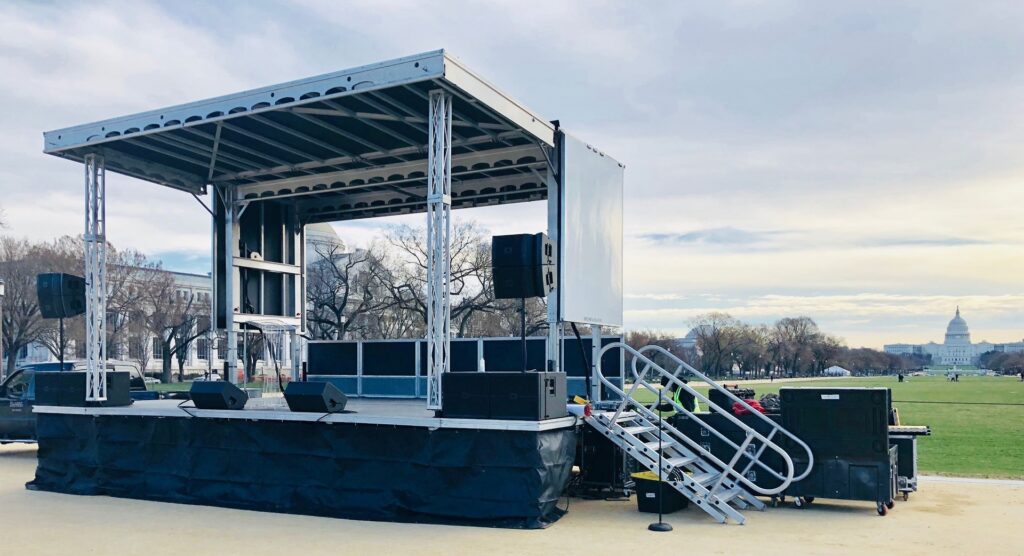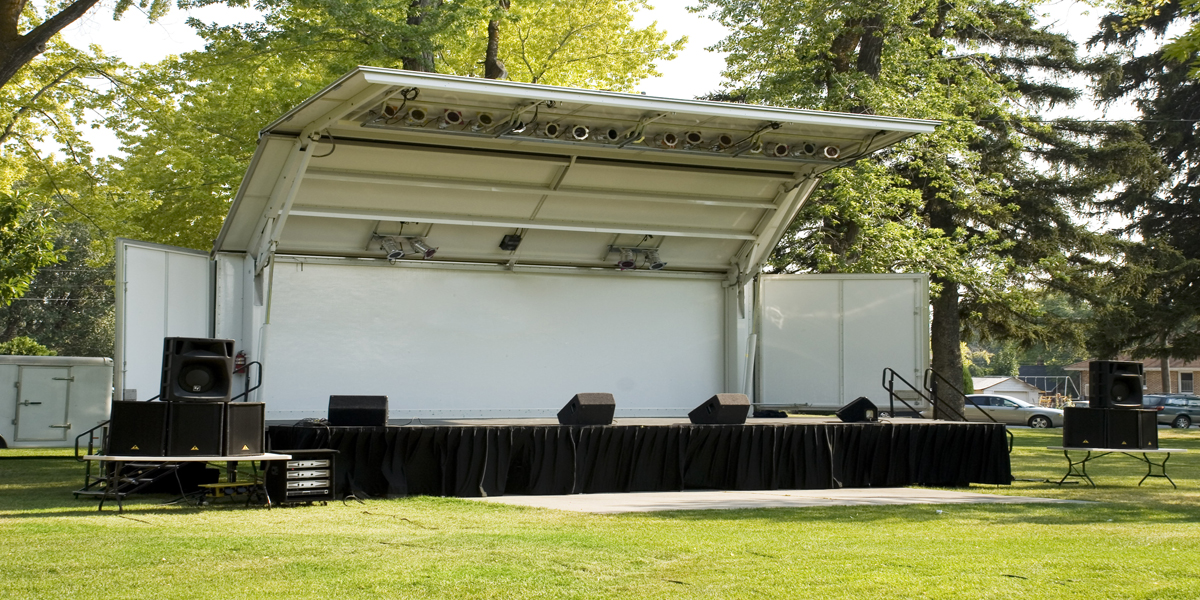Choosing the right mobile stage for your event can make a significant difference in the experience for both performers and audience members. With the right mobile stage, you enhance visibility, sound quality, and overall safety—contributing to a memorable and successful event. This guide will walk you through the critical considerations for selecting the perfect mobile stage, ensuring a seamless and professional setup. For those looking for high-quality stage rental solutions, companies like Rent For Event offer comprehensive AV and staging services across the United States.
Why Mobile Staging is Essential for Events
Mobile stages are designed to be versatile and efficient, allowing quick setup and breakdown at various locations. They are especially beneficial for outdoor events, festivals, concerts, and corporate gatherings, as they can be easily transported and adapted to different environments. The main advantage is that mobile stages come pre-equipped with structural supports, so you don’t have to worry about lengthy assembly processes. When working with a reliable stage rental provider, you can ensure that your mobile stage meets safety standards while being aesthetically appealing.
Key Factors to Consider When Choosing a Mobile Stage
1. Stage Size and Dimensions
The size of the stage is one of the most critical factors. It should be large enough to accommodate all performers, equipment, and props without overcrowding, while not overwhelming the venue or blocking the audience’s view. Some common stage dimensions include:
- Small Stages: Ideal for intimate events or smaller performances, often around 12x16 feet.
- Medium Stages: Suitable for mid-sized events, providing more space for performers, around 20x24 feet.
- Large Stages: Best for large-scale concerts or festivals, often ranging from 24x32 feet and above.
Assess the requirements of your event and consult with your stage rental company to determine the right size.
2. Location and Accessibility
The location plays a significant role in choosing the right mobile stage. Evaluate whether the event location is outdoors or indoors, and ensure the stage can be easily transported and set up there. Some sites may have narrow access points or uneven ground, so knowing these details ahead of time can help avoid logistical issues. Additionally, keep in mind:
- Surface Type: A stable and level surface is required for safe staging.
- Load-In/Load-Out Space: Confirm that there’s adequate room for stage assembly, disassembly, and any supporting vehicles.
Importance of Weather Considerations for Outdoor Events
Weather Protection
Outdoor events require weather-resistant stages, particularly if the event date is during a season with potential for rain or strong winds. Many mobile stages come with built-in roofs and sidewalls to protect equipment and performers. If your event is taking place in an unpredictable climate, ask your stage rental provider about rainproofing or additional weather shields.
Wind Load Rating
Wind load rating is crucial for the stability and safety of the stage in outdoor settings. Check with your provider to ensure the stage has a wind load rating suitable for your location and time of year, and inquire about additional anchoring options if necessary.
Stage Height and Audience Visibility
1. Stage Height
Stage height directly affects visibility for the audience, especially in outdoor environments where ground level might be uneven. The ideal stage height will depend on the size of the crowd and the venue:
- Low Height (1-2 feet): Suitable for small gatherings where visibility isn’t a major concern.
- Medium Height (3-4 feet): Common for indoor events or smaller outdoor gatherings.
- High Height (5+ feet): Suitable for large outdoor events where the audience is spread out.
2. Visibility Enhancements
Consider adding elements like LED walls or elevated platforms for better visibility if the stage height is limited. Rent For Event, for instance, provides these additional visibility solutions as part of their AV services, which can enhance audience engagement and ensure everyone gets a clear view of the performance.
Structural and Safety Features
Safety is paramount when selecting any stage. Confirm that the stage has adequate structural support and safety features, such as:
- Guardrails and Handrails: To prevent accidental falls.
- Slip-Resistant Surfaces: Essential for performer safety, especially if the stage is uncovered.
- Weight Capacity: Confirm with your stage rental provider that the stage can safely support the weight of performers, instruments, and any other equipment.
Additional AV Equipment and Features
1. Sound and Lighting Integration
For a truly impactful event, sound and lighting integration is key. Many mobile stages come pre-equipped with basic lighting, but for a professional touch, consider customized AV solutions. Rent For Event offers full-service audio, video, lighting, and LED wall rentals, allowing you to create an immersive experience with quality audio-visual effects tailored to your event’s needs.
2. Power Supply Requirements
Check the power needs for the stage and additional equipment. Many outdoor mobile stages require an external power source. Renting power generators or ensuring there are accessible power outlets is essential for uninterrupted performances.
Budget and Rental Duration
1. Understanding Rental Costs
Mobile stage rental costs vary based on size, duration, and additional services. Be clear about your budget when discussing options with the rental company. Some key aspects to clarify include:
- Base Cost: The standard cost for renting the stage.
- Additional Fees: Charges for setup, breakdown, transport, and any extra equipment.
- Insurance: Confirm if insurance coverage is included or if you need to purchase it separately.
2. Rental Duration
Determine the exact duration of the rental, including setup and breakdown times. This will prevent any additional charges and help coordinate with other service providers, such as AV and lighting teams, to ensure smooth execution.
Choosing a Reliable Stage Rental Provider
To guarantee the success of your event, partner with a reputable stage rental provider with expertise in event production. Companies like Rent For Event offer nationwide services in AV production and equipment rental, covering all aspects from audio and lighting to staging and LED wall solutions. With professional support, you gain access to experienced technicians and high-quality equipment to make sure every detail of your event is handled seamlessly.
Benefits of Choosing Rent For Event
Rent For Event specializes in turnkey AV production, available across all 50 states, ensuring reliable and professional support for events of all scales. They offer end-to-end solutions, including setup, AV integration, and teardown, so you can focus on other aspects of your event.
Final Thoughts on Selecting the Ideal Mobile Stage
Selecting the right mobile stage for your event involves considering factors such as size, location, weather resistance, and structural safety. Don’t forget to account for additional equipment needs, like audio, video, and lighting, which can elevate the entire experience. With a trusted stage rental partner like Rent For Event, you can ensure a flawless setup, professional-grade AV production, and a safe, memorable event for all attendees.
By evaluating your event’s specific needs and consulting with experienced providers, you’ll be well-prepared to select a mobile stage that’s perfect for your occasion, setting the stage—literally—for a successful and engaging experience.



